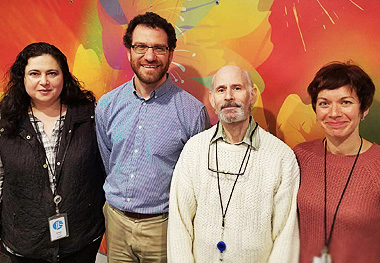
There are about 100,000 Holocaust survivors living in the U.S. Nearly one quarter are over the age of 85, and one in three lives in poverty.
JFS serves 62 Holocaust survivors with care management that can include coordination of medical care, benefits advocacy, financial assistance, housing advocacy and activities to reduce social isolation. We asked those at JFS who work most closely with our region’s survivors: “What have you learned working with Holocaust survivors?”
Lisa Bakke, Family Caregiver Support Coordinator
‘I had no idea there are Holocaust Survivors living in Seattle.’ This is a statement I hear often in the wider community when I speak of the amazing work JFS does.
In my experience, Americans in general are surprised and/or shocked when they learn there are still living survivors of the Holocaust. And, then the next surprise, that so many live in the Seattle area. Personally, I’ve learned many things about tenacity and resilience in my work with survivors.
Adam Halpern, Director of Older Adult Services
I’ve learned that there wasn’t one Holocaust, but many Holocausts. Each survivor had a different experience, lived through different horrors, became a different survivor, and therefore, is a unique person.
To understand a survivor’s Holocaust, I must sit with that person, hear their story and learn from them. Doing this, one person at a time, has helped me see the complexity and resilience of each survivor. Ultimately, I think we can only attempt to grasp the breadth of the Holocaust by listening to each individual story and honoring each person’s journey.

Yelena Mushkatina, Russian Language Geriatric Care Manager
I learned how to be resilient, appreciate everything in life, treasure relationship within families, be kind and grateful, find joy, and not to blame anyone.
I worked with two couples where both spouses went through hiding and evacuation. They have had amazing relationships between each other and with their family members. I think the fact that they lost many family members due to the Holocaust and war influenced how patient, understanding and loving they became.
Lani Scheman, Geriatric Care Manager
We are not only individual selves but also collective selves that are part of a shared history that reaches beyond the current time into the past. I feel that each of these lives is historically significant, and it is important to keep the history alive and to carry it into the future.
Irina Vorona, Russian Language Information & Assistance Specialist
I’m happy to be here for my Holocaust survivor clients. All my grandparents were Holocaust survivors, so I know firsthand how many lingering, long-term effects the Holocaust left for those who managed to survive it.
Alan Wittenberg, Geriatric Care Manager
I have observed resilience. Being newer to the team, I haven’t discussed this period of their lives with my clients, but they have shared their circuitous routes to the U.S. They have moved on with their lives and seem to have great support from family.



